Growing up, my mom would often make coconut milk-based curries, stews, and desserts that I loved. The rich, creamy taste of coconut milk added so much flavor and texture to dishes. As I got older and started cooking more on my own, I realized how versatile this ingredient is – it can be used in both sweet and savory recipes!
When I saw the article “48 Dreamy, Creamy Recipes You Can Make With a Can of Coconut Milk” on The Spruce Eats website, it brought back so many memories. The recipes highlighted how coconut milk can be used to make delicious curries, soups, stir fries, drinks, and even cakes and puddings. I was excited to try some of these recipes in my own kitchen.
In particular, the Coconut Chicken Curry recipe caught my attention</span>. As the passage describes, coconut milk adds “luxurious texture and mild sweetness” to this satisfying chicken curry made with potatoes, sweet potatoes and carrots. This sounded like just the type of flavorful, comforting dish I grew up eating.
I decided this weekend I would go to the store, pick up a can of coconut milk, and whip up this Coconut Chicken Curry. I can’t wait to be transported back to my childhood through the rich aromas and flavors! Let me know in the comments if you try any of these coconut milk recipes from the article – I’d love to hear how they turn out!
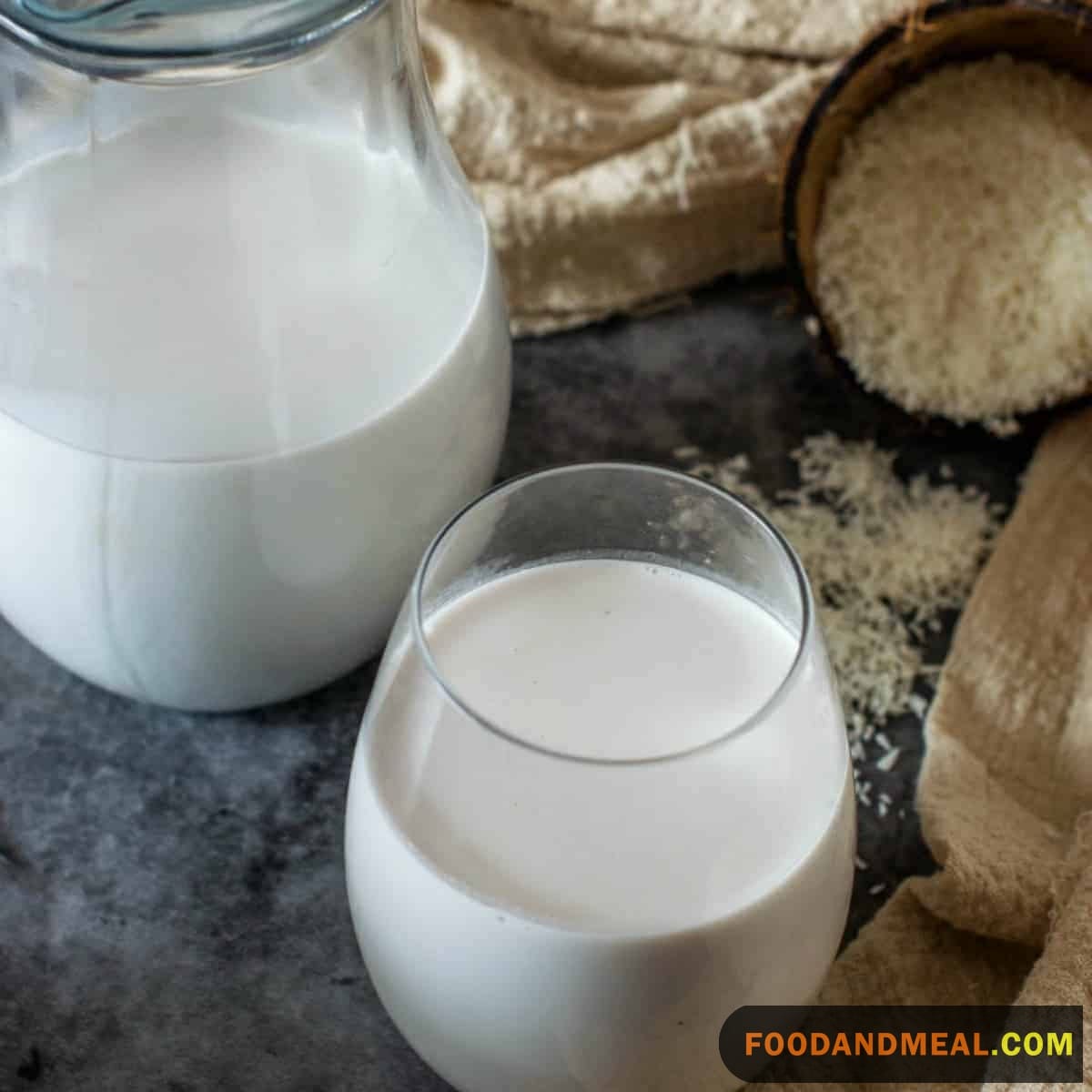
Coconut Milk Recipe
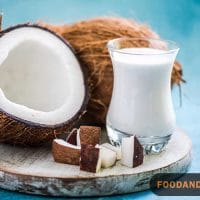
Coconut Milk
Ingredients
- 1 cup dried coconut chips
- 2 cups water
Instructions
- Heat water on the stove until it’s hot, but not boiling.
- Put coconut chips in blender.
- Pour hot water over the chips.
- Blend on high for 2 minutes, or until you get a creamy, thickliquid.
- Line a strainer or colander with cheesecloth.
- Pour the coconut milk through the lined strainer into a bowl.
- Ball up the cheesecloth and give it a good squeeze to press theremaining liquid through.
- Transfer your homemade coconut milk from the bowl into a glassjar or other container.
- Use the homemade coconut milk immediately, or keep in therefrigerator for up to four days.
Video
Notes
coconut remains. For example you can add them to meat balls, salads,many
curry recipes, pureed soup and risotto.
Nutrition
© Food And Meal
This website provides approximate nutrition information for convenience and as a courtesy only. Nutrition data is gathered primarily from the Spoonacular Database, whenever available, or otherwise other online calculators.
Making Coconut Milk using a Pressure Cooker
To prepare coconut milk, start by roughly chopping the coconut meat into manageable pieces. These pieces don’t need to be perfect; their main purpose is to facilitate efficient extraction. In a pressure cooker, combine the coconut chunks with hot water, ensuring a secure lid seal. Set the pressure cooker to a high setting and let the mixture cook for 15 minutes (or until a stovetop pressure cooker reaches full pressure). Once cooked, turn off the heat and allow the pressure to release naturally for an additional 10-15 minutes.
After the pressure has fully released, open the cooker and stir the mixture well. Pour it through a fine-mesh strainer or cheesecloth into a large bowl, pressing the coconut meat to extract as much liquid as possible. For a smoother texture, you can strain it twice.
Let the coconut milk come to room temperature before transferring it to a glass jar or bottle for storage in the refrigerator. Remember to shake well before each use, as natural separation is normal. This process ensures a delightful and fresh homemade coconut milk ready for various culinary creations.
Cooking Tips
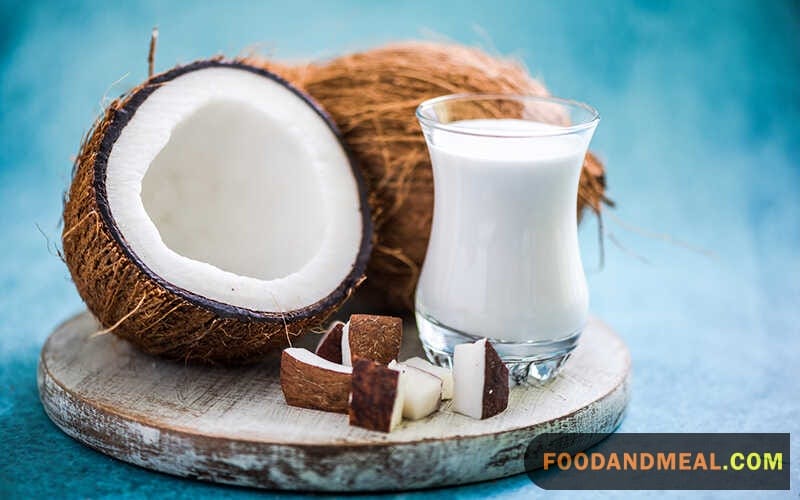
Coconut milk is a versatile ingredient that can elevate both sweet and savory dishes. When cooking with coconut milk, it’s important to understand the differences between sweetened and unsweetened varieties as well as full-fat and lite options. In general, I prefer to use full-fat unsweetened coconut milk as it provides the richest coconut flavor and allows me to control the sweetness.
Before using a can of coconut milk, it’s crucial to give it a good shake or stir to emulsify the layers of cream and watery liquid. Failure to do this can result in dishes that are overly fatty or bland. I’ve made this mistake myself and it’s so disappointing when a curry or stew doesn’t turn out properly because I was careless with my coconut milk!
Coconut milk shines in both sweet and savory dishes from creamy vegetable soups to luscious desserts. It also makes an excellent non-dairy substitute in baked goods, adding moisture and a subtle coconut flavor. I personally love using it in my banana bread recipe instead of regular milk. The coconut essence pairs so nicely with the bananas.
While coconut milk has many culinary applications, I find it really brings a special touch to Southeast Asian curries and stews. Its natural sweetness and fat content perfectly balance the heat of spices. The next time I make my go-to red curry recipe, I may even try adding extra coconut milk for an ultra-creamy, toning-down-the-spice effect. Though I’ll have to resist drinking all the leftover coconut milk from the can – it’s so tasty on its own!
Serving Suggestions
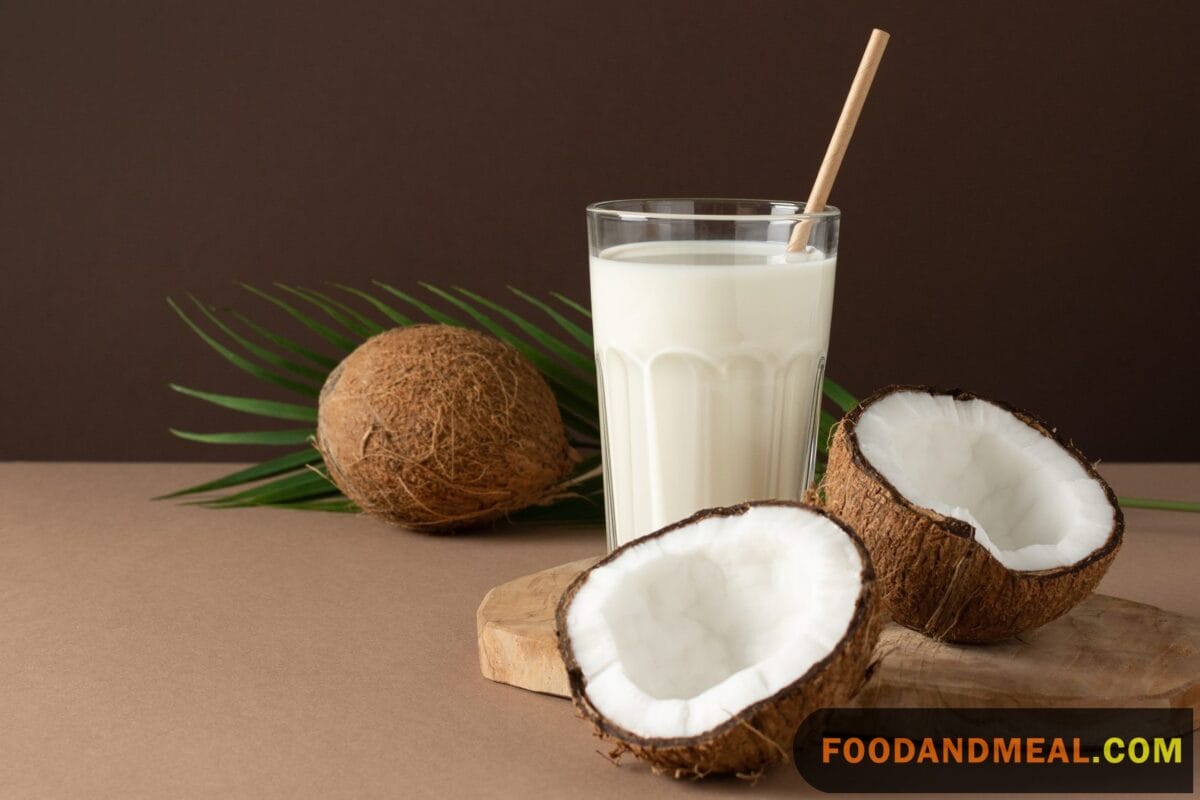
As you delve into a diverse range of recipes, the subtle and nutty undertones of rice milk add a unique touch to both savory and sweet dishes. Start your day with a nutritious and energizing Breakfast Muffin Cup, complemented by the creamy goodness of rice milk.
For lunch, journey into the heart of Japanese cuisine with a comforting bowl of Teriyaki Salmon accompanied by a side of perfectly seasoned Coconut Rice made with coconut milk. The delightful pairing of these flavors brings a symphony to your palate.
As the day unfolds, consider a delightful dessert option like Matcha Ice Cream, where the delicate essence of rice milk enhances the matcha’s earthy notes. Indulge in the velvety texture of Chocolate Babka, and let the richness of rice milk elevate each decadent bite.
For a savory dinner experience, explore the world of Asian cuisine with a mouthwatering dish of Yakimeshi no Tori, where the nutty flavor of rice milk perfectly complements the aromatic spices. Alternatively, savor the comforting warmth of Seafood Miso Ramen, enhanced by the smooth and creamy texture of rice milk.
As seasons change, adapt your culinary delights with a cozy bowl of Pumpkin Porridge, offering a perfect balance of sweetness and warmth, further enhanced by the lightness of rice milk.
End your day on a sweet note with a delectable Blueberry Cobbler, enjoying the natural sweetness of the berries alongside the refreshing qualities of rice milk. The possibilities are endless, and rice milk stands as a versatile ingredient, transforming every dish into a culinary masterpiece.
FAQs of coconut milk
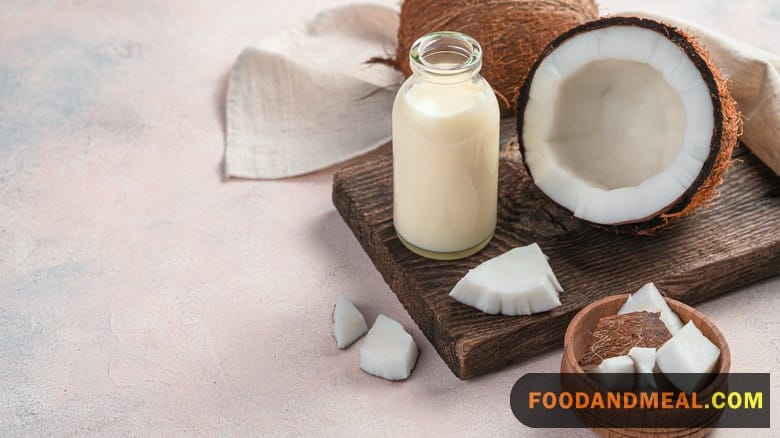
- Can I use coconut milk as a dairy milk substitute in every recipe?
Absolutely! Coconut milk can be a fantastic substitute in most recipes, especially in curries, desserts, and beverages. However, it will impart a coconut flavor, so be sure the dish complements it. - How long does homemade coconut milk last in the fridge?
Homemade coconut milk usually lasts for 4-5 days when stored in an airtight container in the fridge. If it smells or tastes sour, it’s time to toss it. - Is there a difference between canned coconut milk and the beverage cartons I see at the store?
Yes, there is. Canned coconut milk is usually thicker and richer, intended for cooking. Beverage cartons are often diluted and might contain added sugars, making them more suitable for drinking straight or adding to cereals. - Can I freeze coconut milk?
Certainly! Freezing coconut milk is a great way to preserve its freshness. Remember, though, it might separate upon thawing, so give it a good stir or shake once defrosted. - I noticed a thick layer on top of my canned coconut milk. What is it?
That’s coconut cream! It’s a thicker, more concentrated form of coconut milk. You can stir it into the milk or use it separately in recipes that call for coconut cream.
Conclusion
In conclusion, coconut milk is a delicious and nutrient-dense milk alternative that provides many health benefits. It is a good source of essential vitamins and minerals, healthy fats, and antioxidants that can support heart health, immune function, and bone health. Incorporating coconut milk into your diet can be a simple and tasty way to boost your overall health and well-being. If you’re interested in making your own coconut milk at home, consider trying the Milky Plant, a kitchen appliance that can make plant-based milk in just three minutes at the touch of a button!
As mentioned in the article on Food And Meal, coconut milk contains lauric acid, a type of saturated fat that can help raise levels of HDL (good) cholesterol in the body. This can lead to a reduced risk of heart disease and stroke. Additionally, coconut milk contains antioxidants, such as vitamin C and E, which can help protect the heart and blood vessels from damage
Hi! I'm Nazia of ‘Nazia Cooks’, a self-taught baker and cook residing in Chennai. Rooted in the rich South Indian culinary landscape, my palate has expanded to embrace global flavors. I revel in crafting fusion dishes, melding traditions to birth unique tastes.



